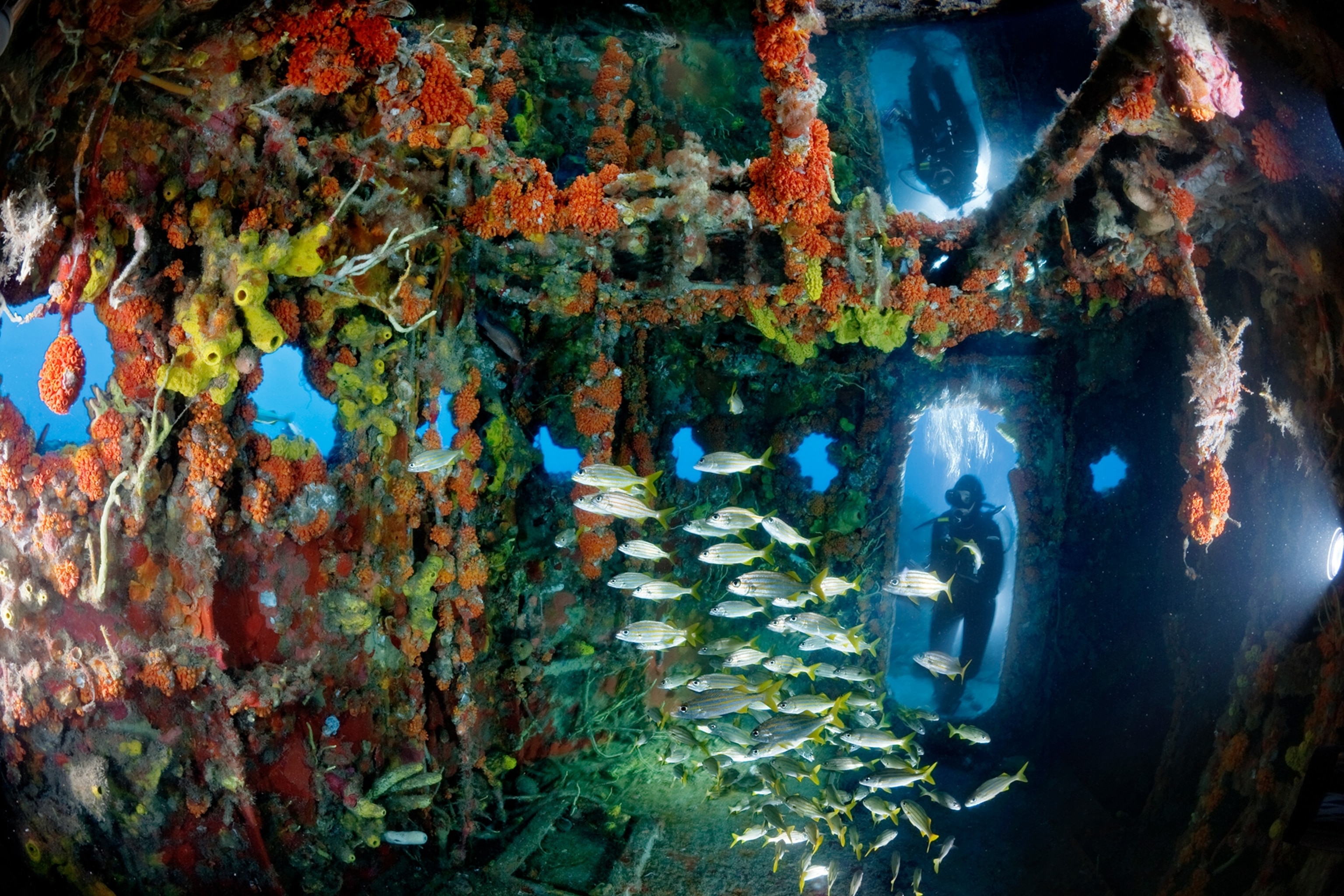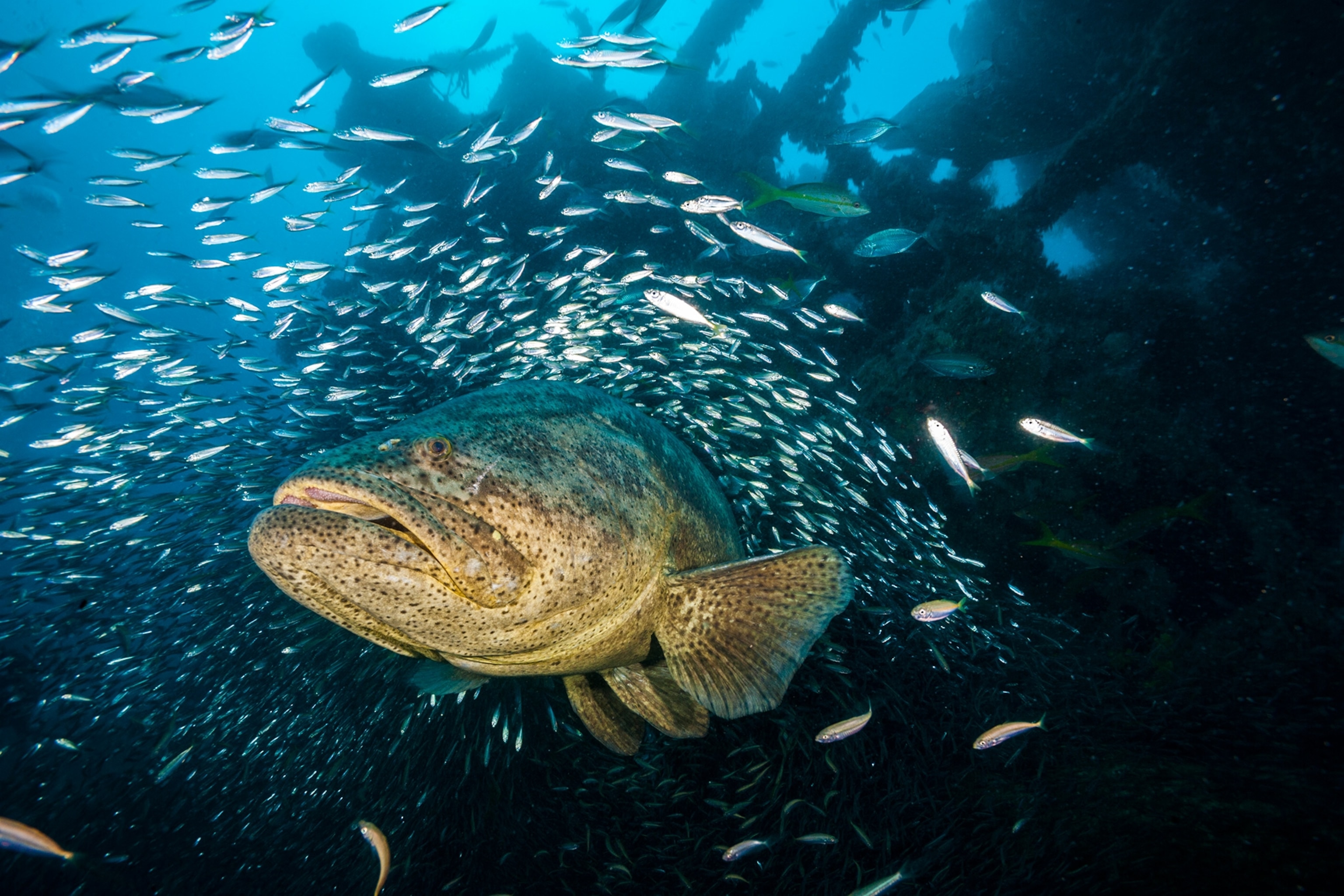When Chris Taylor presses play, footage of blue wrasse and greater amberjack fills the screen. The fish whirl and spin against a vivid backdrop of corals, sponges, and algae. When Taylor, an ecologist at NOAA's National Centers for Coastal Ocean Science in Beaufort, North Carolina, asks visitors to the Centers where they think the video was taken, he’s not surprised to hear the Florida Keys or the Caribbean. But the guesses are invariably wrong.
“These highly structured reefs are right off our coast,” Taylor says. “There are all of these brightly colored fishes that defy expectations.”

A new study in Nature Communications Biology by Taylor and Avery Paxton, a marine ecologist who divides her time between NOAA and the Duke University Marine Laboratory, shows artificial deepwater reefs off the coast of North Carolina increased the number of tropical and subtropical fishes at the northern edge of their ranges. These findings have important implications for fishes in warming waters. As ocean temperatures rise, artificial reefs may facilitate the movement of these species towards the poles, where they may be able to find habitat that is more suitable in the future.
“It matches up with what we’ve seen anecdotally, so it’s nice to see a formal study of this,” says Robert Martore, a marine biologist with the South Carolina Department of Natural Resources.
Accidental (and recreational) reefs
Rocky reefs like the ones that occur naturally off the coast of North Carolina function much like their coral reef cousins. But unlike tropical reefs, which have an underlying structure built by living coral, the skeleton of temperate reefs is made of rock or other non-living substrates. Said rock can take many forms. It can be as flat as a parking lot or a seafloor strewn with boulders. Still other temperate reefs form in the cliffs and ledges of the continental shelf.
Supplementing these natural reefs are artificial reefs, that range from shipwrecks to deliberately placed human structures such as concrete pipes, bridge trusses, and decommissioned tugboats, says Martore, who also runs the state’s artificial reef program.
Although the popularity of artificial reefs has increased in recent years, the idea isn’t new. Humans have been accidentally making reef structures as long as they have been exploring the oceans (and wrecking their ships in the process). By the 1800s, some fishers were intentionally throwing logs into rivers in order to create habitat for the local fish they wanted to harvest. In fact, up until recently, Martore explains, most artificial reefs were created specifically for fishing.
“Artificial reefs have really been built so people can go fishing” Martore says. “It’s only been recently that people have started looking at reefs for different purposes.”
Today’s artificial reefs often go far beyond simply dumping junk in the ocean. Researchers can design and build custom structures for use by specific groups of fishes in specific life stages. For other types of reefs, researchers can repurpose objects that have outlived their usefulness on dry land, such as rusted-out cars and military vehicles. These create some of the best reefs, once they’ve been deep cleaned to remove any chemicals that could be harmful to marine life or pollute the environment.
Location, too, is key. Scientists don’t want to drop these reefs structures just anywhere. Artificial reefs do the best job of providing fish habitat when they’re located away from naturally occurring reefs.
“They can be oases in a desert of sand,” Taylor says.
(Meet the man who sinks the world’s biggest ships for a living)

Fishes from afar
Scientists have long known from recreational and research dives that local fish use artificial reef habitats. What scientists didn’t know was whether these structures benefitted fish living at the edge of or even beyond their natural ranges. Paxton, Taylor, and colleagues studied 30 reefs in the waters off North Carolina by diving to the ocean bottom, laying down a measuring tape, and counting all the individual fish that swam over the tape. The researchers repeated their measurements at least four times each year between 2013 and 2015 to capture seasonal differences.
During her first dives, Paxton was surprised at the wide range of tropical fish on the reefs.
“I was seeing butterflyfish and angelfish. I thought, ‘Is my mask fogged?’ ” Paxton says. “But there they were.”
Back in the lab, the researchers analyzed their data to reveal that the tropical and subtropical fish—including SCUBA and snorkel favorites like blue chromis, purple reef fish, vermillion snapper, and bar jack—happily made their homes on the artificial Carolina reefs. Also interesting, the fishes preferred the reefs in deeper water, between 80 and 115 feet below the surface.

Paxton and Taylor can’t say exactly what makes tropical fish hang their shingles on deeper reefs. More research is needed to tease apart why. But the team suspects it’s some combination of the presence of the zooplankton the fishes eat, the structural complexity of the artificial reefs compared to natural ones, and the proximity of the deepwater sites to the warm Gulf Stream off the continental shelf.
Regardless of the reasons, the researchers say that the presence of these reefs may help save vulnerable marine species by providing valuable habitat as warming oceans force fish species toward the poles.
